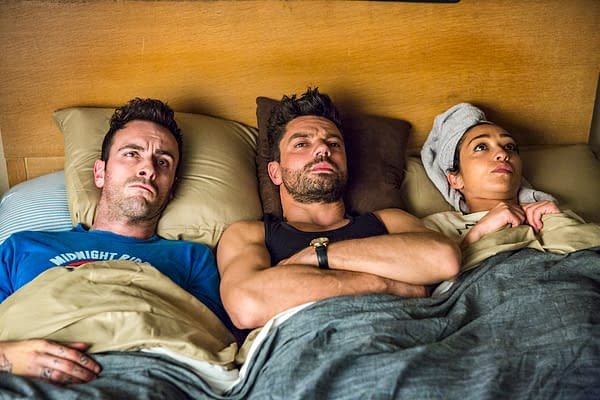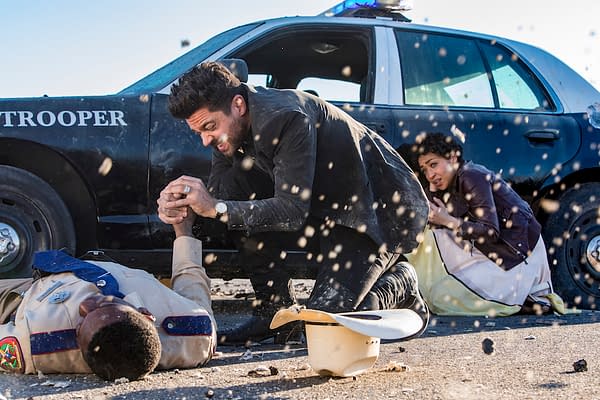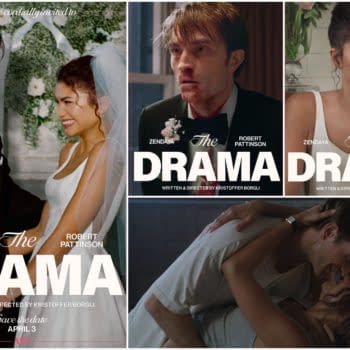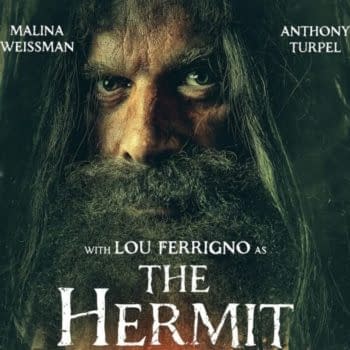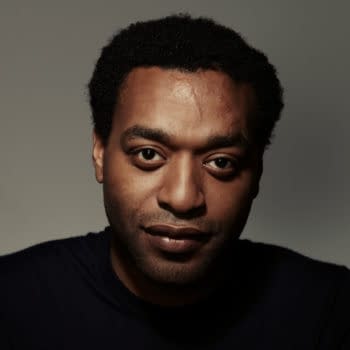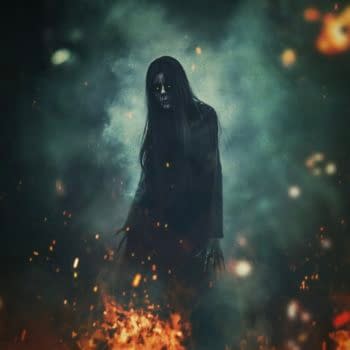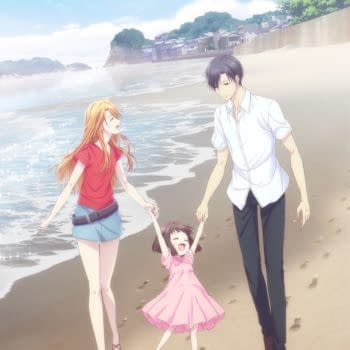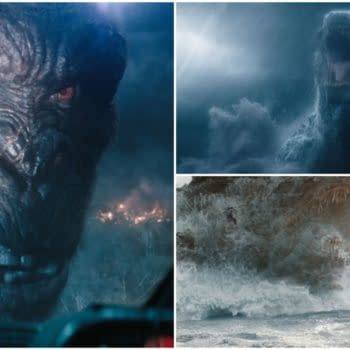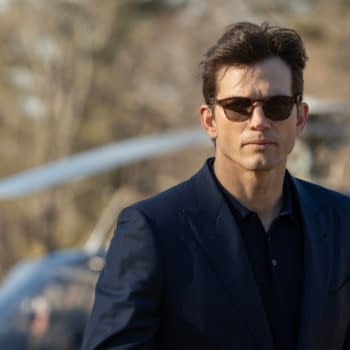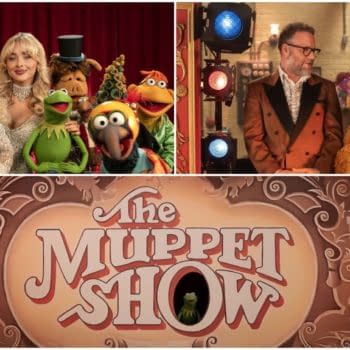Posted in: AMC, Movies, TV | Tagged: amc, dominic cooper, entertainment, preacher, ruth negga, television
Preacher Season 2 – The Source Material Really Shines Through
Written by Mathew Quitney
Preacher Season 2 premieres tonight, Sunday June 25th at 8 PM on AMC, and after having seen the first three episodes, I can say that it is very much worth your time. Season 1 was faced with an uphill battle, adapting a beloved property that had seen so many failed attempts at realization. Season 1 was an interesting and unexpected take on Preacher, acting as more of a prequel to the series proper. With Season 2, the promises of the source material really shine through on the screen, and it feels reinvigorated. I recently had the opportunity to speak with some of the Cast & Crew on the series return:
Dominic Cooper (Jesse Custer): Strangely, it doesn't feel like we've gone back. It feels very much like a different show actually, this season. (We) very much had to establish something about the world and the characters for people that didn't know anything about the comics originally, so it was good to inhabit a real world and a real space and truly understand what motivated these people, before we went on this epic crazed adventure.
Evan Goldberg (Co-Creator): (1st Season as origin story) It was a conscious decision from our conversations with Garth and Sam. We discussed how the comic goes from 0-60 and hurls you into it, tells you a lot of info very quickly, and also it never shows the Preacher preaching. You know, he's got to sell those comics, he's got to get everyone hooked. But we have a bit more time.
Seth Rogen (Co-Creator): To explore his relationship with God a little bit more was something we thought we could do. I think if you read comics, it's not that crazy, a lot of the ideas. But if you're just someone who watches television and doesn't read comics, they're pretty out there ideas. So we tried to be aware of that and kind of slowly build up to some of the things that if you're a comic book reader, you can just accept. It's not as jarring if you're the type of person who's geared towards that anyway, and we tried to be aware that the people who watch this show, hopefully, are not just people who are instantly able to throw themselves into these completely alternate universes with completely alternate rules and very large world-building ideas. We thought in order to ground the show, we would build up to some of that stuff.
Seth Rogen and Evan Goldberg are described by their cast as the "tastemakers" of the project. They brought in Sam Catlin to act as show runner, and really pushed to have the series made.
Seth Rogen: Let's try to use the vehicle we've built to its natural potential, and really do things that are surprising, ad don't just break narrative expectations but break structural expectations, break expectations for what happens in a tv show.
That to us was exciting creatively. It seemed like in a crowded marketplace, couldn't be a terrible idea to play to our instincts and to really indulge what it felt like the show could do, really let the show do the things that only it could do…Yeah it's weird, but it's weird in only a way we could do, so maybe we should do it.
Evan Goldberg: (A film adaptation) was a flawed mission because it's just too big a thing. That's what the general appeal was for me and always has been, of the comic and the show, it's the universe.
Seth Rogen: It's the tangents, it's really exploring the side characters and the backstories of characters…It's not just from a narrative standpoint, but a content standpoint, bizarrely, there's a lot of things in the show that I watch, and we'd have a hard time convincing a movie studio to let us do that.
Sam Catlin (Show Runner): It feels like Preacher's a world without adult supervision, in much the same way that 21st century America probably feels, to a lot of people, like it doesn't have adult supervision.
Seth Rogen: Part of the fun of the show is that there's a lot of great shows on television, but tone is not something that people play with as much as I think we're trying to. And it's all from the comics. It's 100% from the comics, like the comics do that. They're funny, they're scary. There's scenes where they're singing in the car, driving around having fun, and then there's scenes that have the most intense life and death stakes that you could ever hope for. And that's really what we were trying to capture.
Graham McTavish (Saint of Killers): In the wrong hands (the show) could be an absolute disaster. Making a movie out of it anyway, I think is really problematic. Because it's such a broad story. It goes in so many interesting directions and brings in so many interesting characters. That to condense that would be impossible.
The influence of the comic series, created by Garth Ennis and Steve Dillion, will be much more apparent throughout Season 2. The first three episodes alone align themselves much more with the comic than the first season.
Seth Rogen: Garth is very involved, and reads everything, sees everything. That puts us at ease in a large way, because we know he condones it and likes it.
Evan Goldberg: If he didn't it would ruin everything. It would make the best part of my life into the worst part.
Seth Rogen: He's encouraged us to kind of go crazy and take big swings, and he's expressed that he really likes the parts of the show where we do that.
Evan Goldberg: This season gets a lot more in line with some of the comic stuff, that being said, still fantastically different from the comic.
Seth Rogen: There's no one episode that really reflects an issue of the comic. (It's) the closest it's ever been this season, I think it is beginning to take the shape a little bit more of the comic, but still the writers take a lot of creative freedom as far as just trying to make it the best tv show they humanly can. That is the prime directive that they have put in front of themselves.
Sam Catlin: (This season) Jesse's not looking for God in himself, he's looking for God around the corner. That part of it, that roadshow, no matter what I'm going to kick down whatever doors, I'm going to find God one way or the other. That is the show, that is the comic. How we get there, in terms of the plot by plot narrative, its always going to diverge in certain places. And sometimes we're going to have things that are exactly alike and sometimes things are going to be different. There's going to be new characters, but obviously we're not going to leave all the great iconic characters on the shelf. I'm confident that people will recognize the comic book much more in this season.
Graham McTavish: The Saint…is very true to the book. We don't stray away from who he is and why he's doing what he's doing. The whole look of him…We did very consciously want to stick to that. He's a pure character. Not in his actions, but the motivations that he has. It's important we stick to that…You feel a great duty to the source material…The Saint is much more straightforward. You know what he wants. He's not pretending to do anything other than what he's doing.
Ian Colletti (Eugene/Arseface): Preacher is a mesh of all these different genres and I think it stems from Garth's own fascination with American culture, American film. I think that there's so many different genres that bleed into this, that Preacher…can shape shift from episode to episode or storyline to storyline. In a way that I think is very unique.
Graham McTavish: This is a world that Garth created, and in making hopefully multiple seasons, the writers are able to add to that. In a way that Garth approves of. If you'd done the books as written, I think Garth reckoned, they would probably only have gotten a season and half out of, because it moves at such and incredible pace.
Before he passed, Steve Dillon was able to see Season 1 and experience the world that he helped create come to life.
Sam Catlin: One of my first impressions on reading the comic was just how cinematic it was and how bold it was with palette, and (Steve Dillion's) use of wide shots and super close shots. It's been a big influence on (the cinematographers). It's influenced our costumes. It's just been invaluable. He was such a big influence on the show before I even met him. He's sorely missed.
Graham McTavish: I asked Garth about comics, and why he was so particularly interested in using that as a medium to tell stories in, and it is unique in the world that it can create. How it can explore the human condition through these fantastical visual images. I just can't imagine that being done as a film, or as just a straight forward novel.
In addition to pulling in more characters from the book, such as Herr Starr, Season 2 looks like it will continue perfecting its main Cast.
Ruth Negga (Tulip): We've veered so far away from a lot of how you're invited into Tulip's world, (in the comic) she's quite broken and meek when you meet her and I don't think that's how we started off with Tulip. But I think that this season we have an opportunity to explore her more vulnerable side. I think we disarm her, physically and mentally this season. And that's a very naked place for Tulip to be. She's always ready to fight and I think she's been sort of de-fanged in a way this season by certain things.
Joseph Gilgun (Cassidy) – We've got this sort of very domestic version of Cass. He has responsibilities this year. I think since meeting Jesse, who's on this path of redemption, he's having a crack at it himself almost. He had the option of not running into these problems, but he chose to face them head on. In this trio, he doesn't want to just be this idiot Irish sidekick. In fact he says that at one point. "Don't treat me that way. It's not who I am and it's not my function here." I think he wants to prove to the group that he is of some use, so the first thing he does is try and set everyone up with some free digs. Unfortunately, free digs mean responsibility for Cassidy. Something he's not been able to put into practice. For the last 120 years he's been avoiding his problems.
Dominic Cooper: (Jesse) believes he's the cause of the father's death and he believed the lord came to his side and did as he asked because he was so furious about what his father had done to the love of his life, to his best friend. And then he went to live in this…I remember reading the bits about the grandmother and how he was disciplined. When you meet Garth, you're like 'how did you come up with these things' because he's such a wonderfully pleasant intelligent clever lovely man. I have to remind myself, when Jesse sees red, or when he sees someone attacking someone he loves, or he sees something wrong, you go back to a place of being in a coffin underwater for weeks at a time and it's grim. We're slowly getting there. You'll see at the end (of the season) there's a very specific reason why he has to engage in that life again , and it terrifies him more than anything else in the world.
Graham McTavish: There's something frightening about a man walking to try and kill you. He's got a purpose, but he's not in a rush, because he's just going to get to you eventually.
It's like those nightmares you had as children, that you couldn't wake up from. Where there was this thing coming after you, and that thing in my experience was never running. It was always walking. You were trying to run but you could never get away. That's who the Saint is.
Ian Colletti: The backstory for my character, because of the period, is a little bit different than the comic book but Sam Catlin last year had kind of, as it was getting a little darker for (Eugene), from what other people were saying, he told me what the true story was for my character. I've always said, no matter what other characters said about him last season, that I as the actor playing him think Eugene is one of the moral centers of the show, one of the few morally good characters. I like to think that this season there'll be some sort of redemption for Eugene.
Sam Catlin: In terms of the worlds and the tone and the characters that we're bringing in, and sort of the larger…what are Herr Starr's plans, where is Jessie going to go, what happened in his past? All those things are faithful to the comic, but we're never going to be able to have a show where we shoot episodes as issue 21 followed by issue 22. It's never going to work like that, it can't work like that. Garth knows that as well as anyone. It's not a television narrative, and you'd also run out of story really quickly. So what we're sort of trying to do is find little pit stops along the way from the comics, and dig into them, learn more about why is Herr Starr who Herr Starr is. There's a little bit of his origin story in the comic book but we have the opportunity with a long form television show to really get into Herr Starr, get into his childhood, let's get into this and that. That's really exciting.
Ruth Negga: There's this definite tension. Jesse's been given the mission of his life, and both Cassidy and Tulip are dubious about that. They're very sort of hindered by the fact that they don't have any other options. Annville's gone, it's been exploded away. Tulip's on the run from God knows how many people, and so is Cassidy in a way, and he also has no friends left. They've all died because he's so bloody old. So they've found this sort of itinerant misfit-y family. They've founded this for themselves.
Dominic Cooper: When you've been mistreated, and you're angry, you're furious. That's when the real you comes out. All the rest of the stuff is just suppressing it the whole time. And it's just waiting to rear its ugly head. And then there's this sort of addicts release, as he's fighting. Any excuse he has. He'll rarely talk his way out of it. He'll try for a brief brief moment, but then it'll end in violence. He's got the collar, so he will try his hardest but he doesn't have the church or the flock. He really had to suppress himself in that first season because he had a responsibility, and now he's on the road and if anyone gets in the way of his idea of what he needs to find or anyone upsets the people he loves…
The more power you have, the less you understand how to harness it or to use it for the benefit of others. He immediately has no clue.
Sam Catlin: Jessie very much wants someone to stand up and say I'm responsible for this, hold them to account. If things are so fucked up, why are they fucked up? Who do I have to punch to get answers around here?
Seth Rogen: One of the major themes of the show is good vs evil and what is that, is that even a thing? No evil person really thinks they're evil, and if you later realize you were evil, can you redeem yourself? Can you be somewhere in the middle? A show where the (players) are heaven and hell, and angels and demons, that's inherently something that we talk a lot about. That's something that really interests us.
Ian Colletti: Anyone who's read the comic knows there's nothing really else like it, and it's just completely outrageous, and I was very intrigued to see what a television adaption would look like of this story and especially of (Eugene). We're at the golden age of television right now and to be making something that is bold and unique I think is rare, and I think Preacher is both of those things.


